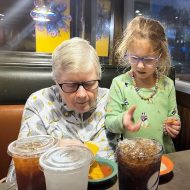
“Riding under a baloon beats making hay, but
believe me after we came down no more baloons for us.
How foolish to want to be way up in the air,
& then after you are up there,
you want to be down.”
I’m not sure who the two men are in the “baloon,” but this post card was one of a very few saved by my maternal grandmother, Louise Schlinke Boring a/k/a Dude to me. I believe the man on the right was one of my grandmother’s five brothers, and the man on the left was my maternal grandfather James Marion Boring, Sr. The post card was unsigned and not stamped which makes me imagine it was hand delivered.
What struck me about the card was the message written in pencil on the back, regardless of the missing names or how it was delivered. The people in my grandmother’s family were farmers so they were well acquainted with the labor involved in making hay in the hot Texas sun. My grandfather, on the other hand, was an adventurer who started and failed in business enterprises from root beer stands in Houston to a movie theater in Richards with four children along the way during his lifetime (1887 – 1938). I can believe the balloon ride was his idea.
No more balloons for these guys, though. “How foolish to want to be way up in the air, & then when are up there, you want to be down.”
I’ve felt that same feeling more than once in my life, too…not about balloon rides, of course. I’m not that brave.
Stay tuned.
Published by Sheila Morris
Sheila Morris is a personal historian, essayist with humorist tendencies, lesbian activist, truth seeker and speaker in the tradition of other female Texas storytellers including her paternal grandmother.
In December, 2017, the University of South Carolina Press published her collection of first-person accounts of a few of the people primarily responsible for the development of LGBTQ+ organizations in South Carolina. Southern Perspectives on the Queer Movement: Committed to Home will resonate with everyone interested in LGBTQ+ history in the South during the tumultuous times from the AIDS pandemic to marriage equality.
She has published five nonfiction books including two memoirs, an essay compilation and two collections of her favorite blogs from I'll Call It Like I See It. Her first book, Deep in the Heart: A Memoir of Love and Longing received a Golden Crown Literary Society Award. Her writings have been included in various anthologies including Out Loud: the best of Rainbow Radio, Saints and Sinners New Fiction from the 2017 Festival, Mothers and Other Creatures; Cowboys, Cops, Killers, and Ghosts (Texas Folklore Society LXIX).
She is a displaced Texan living in South Carolina with her wife Teresa Williams and their dogs Spike, Charly and Carl. She is also Naynay to her two granddaughters Ella and Molly James who light up her life for real. Born in rural Grimes County, Texas in 1946 her Texas roots still run wide and deep.
View more posts


The post card is awesome and I love the story.
LikeLiked by 1 person
Thanks so much, Donna. I thought of your post card collection when I was looking at the very small number I have. Most of mine are family pictures, but I have a few that show places in Texas without the family twist. They’re fun, though. I see why you like yours.
LikeLike
This could be part of the TX Medical School in Galveston??
On Tue, Feb 18, 2020 at 10:54 PM I’ll Call It Like I See It wrote:
> Sheila Morris posted: ” “Riding under a baloon beats making hay, but > believe me after we came down no more baloons for us. How foolish to want > to be way up in the air, & then after you are up there, you want to be > down.” I’m not sure who the two men are in the “baloon” >
LikeLiked by 1 person
I thought it looked like a hospital I knew. Do you have any idea who the two men are? I just guessed from other pictures I had.
How are you all doing?
LikeLike
P.S. It hit me when I was working on this family history that Mother’s father died when he was 51, and her husband died when he was 51. Don’t you find that weird?
LikeLike
Boring? Refuse to believe this name is from your family tree! Hot air balloons are not for me either, you have to get up before the dawn of crack to get to the ‘favoured’ launch pad and then you get turfed out on your bottom in the mud on ‘landing’. Or something like that (ruder) according to my wife 😀
LikeLiked by 1 person
Wow – you have an adventuresome wife like Pretty!!
Boring should never have been a last name in my family!!
LikeLike
Actually, a little side story is that when Europeans arrived in America, their names were often either misspelled at immigration or changed deliberately at some point in later years. My paternal grandfather’s last name was probably Boren or Borin or somthing else even. How they settled on Boring is a mystery!
LikeLike
I will look out for them when the weather changes, Sheila, they’re flying every day over our house…MOL😸Pawkisses for a Happy Day🐾😽💞
LikeLiked by 1 person
Too funny, Granny – please do look out for them!
LikeLiked by 1 person
Now there’s a fine metaphor combined with family history. Amazing memento!
LikeLiked by 1 person
Thanks, Susanne…that’s how I felt, too.
LikeLike
I share that feeling too, Sheila. Way too many times I’ve asked, “Child! What were you thinking???!!!” 😂
But that postcard is priceless.
LikeLiked by 1 person
Child, what were you thinking???Aint that right, Ann? You made me smile at that thought.
LikeLike